Winners of the Montana Memory Project Short Story Contest!
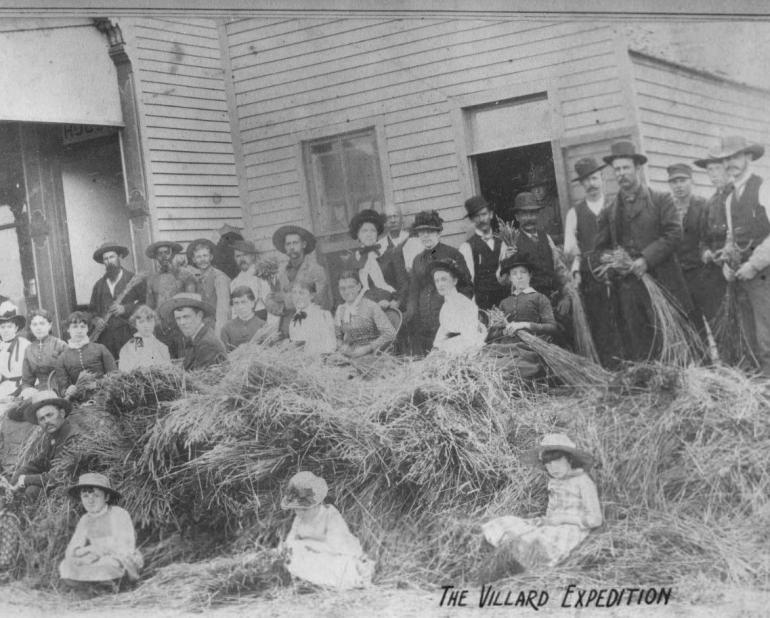
1st Place in 3rd - 6th Grade Category:
Search and Find Contest
By Eric Juhl, age 11
Barney Barnum was the owner of the general store in Butte, MT. His store was very prosperous since it was the only one in the town. Every year, Barney would host a fair. Barney, one year, decided to have a great search and find contest. He took a great pile of hay and threw ten sewing needles into it. Nine were painted silver and the last one was painted gold. Whoever found a silver needle would get fifty cents and whoever found the gold needle would get a whole dollar.
Nearly the whole town went to the search and find contest. Barney did this to see who, was the best finder. He was looking for his wife’s golden wedding ring, that he lost. He had lost the ring in the very same pile of hay that he was hosting the search and find contest. His wife had gone to visit her sister who had not gotten married yet, and she didn’t want to make her jealous, so she gave the ring to Barney for safe keeping.
Barney had lost the ring when he had been sleeping on the pile of hay with the ring in his pocket. He was sick of his bed because there were too many fleas. When a boy startled him and made him jump, so the ring flew out of his pocket and disappeared into the hay.
So, he had decided to host the search and find contest, to find it. Everyone in the town showed up. Most of the adults sat and watched as their kids searched for needles. The younger boys threw hay everywhere. Older boys carefully searched by the edges. All the girls were at one side carefully searching. One of the younger boys threw the golden needle and it hit an older boy in the head. After the needle fell in the pile all the children rushed to where the older boy was and began searching carefully.
One boy, named Eric, hung back from the rest who were looking for the golden needle, to find the silver needles. After a while he saw something golden and picked it up, when he sees it is a ring, He asks Barney why there was a ring in the pile. Barney exclaimed, “That is my wife’s ring.” and gives Eric three dollars.
When Barney wife got home, one naughty boy who had not got anything from the search and find contest, told her about the lost ring. Barneys wife was so mad at Barney, she boxed his ear’s. Even so it was customary to host a search and find contest every year afterwards.
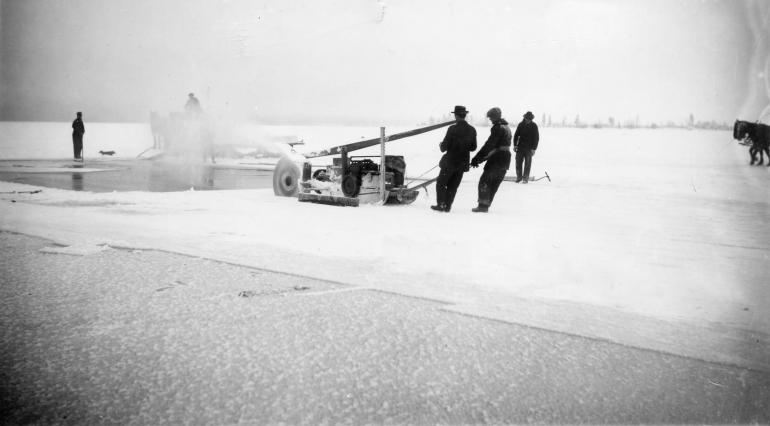
Source: Montana Memory Project
2nd place in 3rd to 6th grade Category:
The Beast of Echo Lake
by Ray Biggerstaff
“Come quickly! There’s a fish in the ice! It’s…it’s…huge!!”. It was January 7, 1852 when my friend Henry called me to the lake to see this ‘fish’. When we got there, men were cutting the ice with an ice harvester. The water was murky as usual.
“There is nothing there”, I said.
“Keep watching, you’ll see. Its huge! Its tail is as big as a carriage!”
“Look, I have to get back to the printing shop befo-”. I got cut off by a giant eye that rose to the surface of the water. My heart skipped a beat. “It’s real…its huge… it’s amazing!”
“I told you it was real! The mayor said he wants a better look at the beast to decide what to do about the matter. That’s why those men are cutting the ice with the ice harvester”, Henry explained. As soon as Henry explained to me what was going on, the mayor arrived in his chaise. The chaise was the point of attention when it road through town. It had beautiful horses that had their coat of fur just brushed so that it shimmered in the dim light of January. When the chaise stopped, the mayor said to the men, “Is the hole big enough to see the whole fish?”
“Yes sir. The creature is very curious about our work. It keeps swimming to the top to stare at us!”. The mayor walked over to the lake and brushed the snow that was covering it to see a black blur swim here and there.
“Winter is harsh with little food and frigid weather, so I have decided that tomorrow we will gather a group of men to try to kill the fish for food that will last the whole winter! Cut the hole a bit bigger just so the fish might fit through. As for everyone else, continue your daily routine, and I will gather a party to help catch the beast.” Right when Henry and I were about to leave we heard the mayor call our names. We both turned around and gaped at what we heard. I was to be lookout and tell the men when to throw the hooks at the beast, and Henry was going to be the one to help strike the fish with harpoons.
The next morning, I headed for the lake. When I got there everything was set up, and everyone got into their positions. When I looked down from the lookout, I saw the black blur swim past the hole. The fish sensed the commotion outside and rose to the top. “Fire!!”, I yelled. When the hooks hit the fish, it launched out of the lake and onto the ice, flopping around like crazy! Its tail hit the lookout and the wooden beams fell beneath me. I hit the ground with a thud. Everything went black.
When I woke up, I heard screams and people crying in fear and pain. I got up dizzy and saw a faint form of a face float up to the other side of the ice. Then I realized that the familiar face was Henry. “Noooo!” I screamed. My feelings were a mix of fear and anger. I was angry at the fish, the mayor, and everyone else who agreed with this foolish idea. I took a harpoon and threw it with all my might at the flopping beast. It crashed to the ground (crushing some men) while its milky eye stared at the sky.
I retrieved Henry’s body by cracking the ice with a harpoon, though the effort was futile. The mayor got onto some ruble and gave a speech: “Many men died here and gave there lives away to feed family and friends. We shall respect them forever. This lake will now be known as Echo Lake for all of the cries and screams that echo in our hearts and minds forever…”
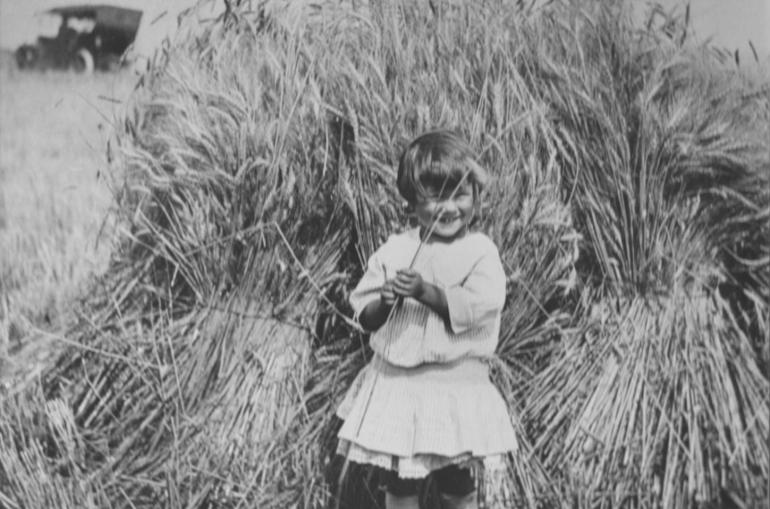
Source: Montana Memory Project
1st Place in the 7th - 12th Grade Categoy:
The Sapphire Pendant
by Isabella Gehrke
In one hand he held her photo and in the other her necklace. He recalled how much she loved that necklace. She would smile and tell admiring friends of how the necklace was her father’s wedding gift to her mother, how the sapphire was from the northwest mountains of Montana, how it was her dream to one day embark on an adventure and move to Montana. Here he stood, without her.
It had been a year since she had passed and he still couldn’t accept it. He knew he was in denial and the thought of doing anything to change that hurt him. It meant accepting the woman he loved was no longer with him.
He thought of his daughter. He was jealous that she was too innocent to understand. Nonetheless she was the one person he had left. She became his motivation to go on after his wife passed. For a few months he was too busy to think about the devastation of losing her. He continued on with his life as if nothing had happened. He was afraid of slowing down. That went well until he was laid off. Feeling that hopeless darkness sink in that night walking home, he reached his apartment building and noticed a flier hanging on the wall. The headline was “Move to Montana!” In the description, he read how he could claim 150 acres for his own and start a new life. Without giving himself time to think, he jumped on the opportunity.
The father checked the time and realized he only had a few hours before he had to be to town. “Liz!” he called, disrupting her antics. The little girl made her way to him as fast as her legs could handle. He picked her up and spun her around. “We need to get you ready.” He took a few minutes to clean her up and they headed to town.
They climbed in their car and drove to town. Their car approached the main street and came to a stop. As he approached a scraping feeling grew in his stomach. He thought of the manigers words, “One-hundred and seven dollars for a new life.” the man sat next to his oblivious daughter and picked up the necklace. He felt her presence when he held it. He thought of her voice and her dream. For the first time he allowed himself to truly miss her. He couldn’t handle pretending like he was ok anymore. The broken father finally allowed himself to break without feeling guilty. A tear fell from his face; he knew what he had to do. His wife was gone but her dream would live on.
“Pleasure doing business!” the Jeweler called. He held two checks in his hand, one was worth 107$, and the rest of the necklace’s worth was on the other check. He held his daughter's hand and walked to the city council office.
“Well, Jim, are ya ready to start new?” called the city manager as they entered the building. The father nodded and handed over the check and the certificate. While waiting, the manager spoke. “There was a fire on this plot a few years back so the original owners left but now it’s as beautiful as ever. It was tragic but death can give rise to something quite beautiful.” He handed the new property owner his signed certificate.
Later that night while exploring the property with his daughter he came to the border of the property. The pair discovered a row of hay stacks. Looking around he noticed the girl had disappeared. He cautiously walked around the hay stacks. Giggles rang out from behind him. He turned around to see his child grinning at him. “Oh Liz,” he said, admiring her smile. He hadn’t realized it until now but she had the same smile as her mother.
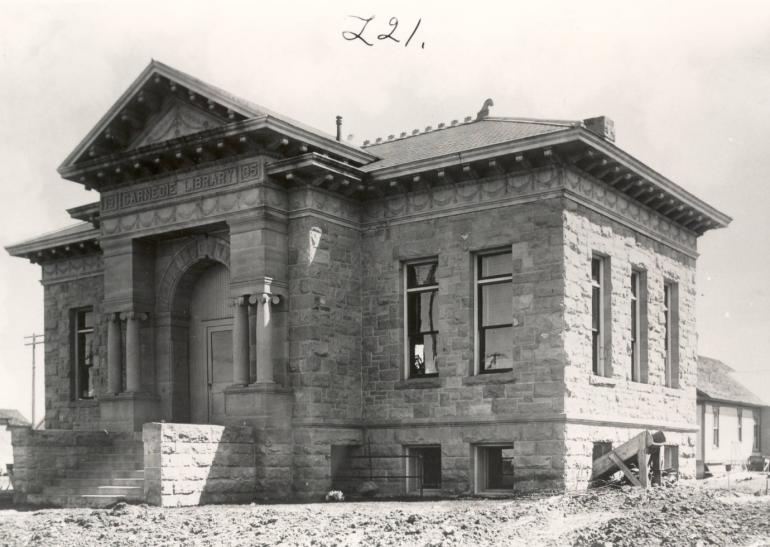
Source: Montana Memory Project
2nd Place in the 7th - 12th Grade Category:
by Clara Marie Kyrouac
It’s easy to take things for granted. Joan had learned this many times, but she didn’t always think about it. When her siblings, whom she thought would always be there, moved away, Joan regretted she had not appreciated them more. Even though she was the oldest, and the one everyone expected to move on and see the world, or at least more than just Lewistown, she was the only one still left. No one else was going to take care of her parents. Joan felt trapped, and she wanted to get out, but she never thought her opportunity would come. Then, it came to her.
One of the ways Joan had been able to escape the world she was in was through reading. Sure, she couldn’t leave her hometown, but she could at least read about other places. Even if she couldn’t visit her other siblings, at least she could gain an understanding of where they were by reading about those places.
Joan loved to read, but while she had the time for it, she didn’t have enough books to read. That's why when someone brought up the idea of a library, she felt like it needed to happen. Joan knew many people who wanted more access to books, and a public library would be the best way to get that access. There had been talk about the desire for a library for a long time, but no one had ever acted on it. Until one day when the town was informed they had a donor for the library. That day was one of the happiest of Joans life, and she remembered it as she walked through the library rows years later.
“Joan, come here.” Joan's father called out as soon as she walked through the door to her parent's house.
“Coming!” Joan said. She had just heard the news, and she was ecstatic.
“Have you heard yet?” Joan's mother asked.
“About the library?”
“Yes dear.”
“I just heard as I was walking over here.”
“When do they think it will be ready?” Joans father asked her.
“It could be a while. But I’ve been waiting long enough, so if it takes them some time to build it, I can be patient.”
It had taken some time to build, and Joan wasn’t a very patient person. However, she was able to make the most of her wait. Joan started organizing a book club that would start when the library opened. She worked with some people in town to hold fundraisers so they could get some money to purchase books. By the time the library was finally open, Joan was more than ready.
She could still remember the first time she had been in the library. There were less books then there were now that the library was more established, but it was still a glorious sight. Shelves of books she and everyone else in town had access to. The day was only made better when she was asked to work at the library. It was a way Joan could make some money, and while Joan was still in her hometown, it almost felt like she was able to be in her own little world. A world consisting of her, some books, and other people who appreciated the books as much as her.
When the library was brought into town, Joan felt like she had a place to go. The library became a second home for her, and Joan made sure to take care of her second home and everyone it served. She held book club meetings, kept track of the books, and helped the other people of Lewistown find books to interest them. No one cared for the library more than Joan.
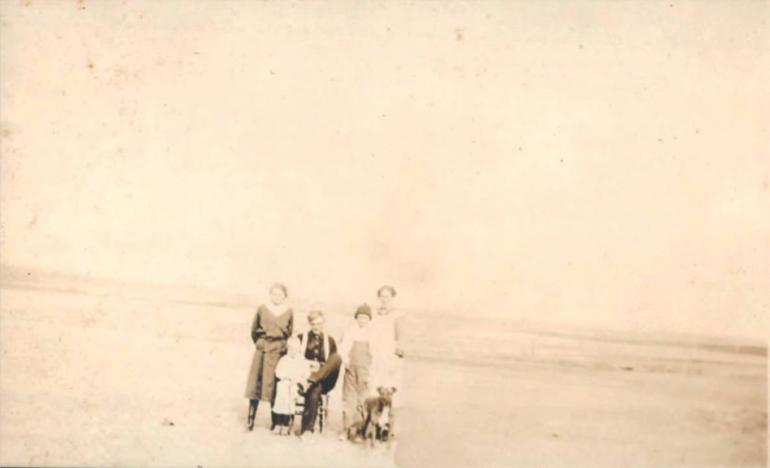
Source: Montana Memory Project
1st Place in the Adult Category:
Letter Home
by Jane Limprecht
Dear Aunt Mara,
Just writing to let you know we’re settling into “the old homestead” – not exactly cozy, but it’s ours. The soil out here gives the atmosphere a yellow glow, which takes a while to get used to. It’s a far cry from the blue skies of home, but the sense of spaciousness is similar. (As if you couldn’t tell from the photo, which contains exactly nothing except us.) Yeah, I realize my branch of the family never traveled farther west than Nebraska, but our how-many-great-greats-grandfather Charlie pushed on and now you’re the lucky one with the mountain views.
After this picture was taken, we started putting in our wheat. Do you remember the Perseverance Rover, the one that carried the little helicopter? Long time ago, February 2021, the year nobody went anywhere – except Mars, apparently. The rocks and dust it collected led to soil improvement techniques, so we can grow crops. I had to check on that helicopter’s name; sometimes the solarnet is kind of slow. I was thinking Intrepid, Intelligent? It’s Ingenuity Mars Helicopter. Love those Rover names: Sojourner, Opportunity, Spirit, Curiosity, and the rest. Same old traits that keep us all exploring.
You might wonder how we breathe up here. Well, that blank beige sky is a shield protecting an artificial atmosphere. It provides oxygen and also rain. No drought, no tornados, no blizzards, and no grasshoppers, thank goodness. None of that “if you don’t like the weather, wait five minutes” nonsense. Nice to have the predictability, but I miss the sunsets back home. The sky covering you with a blanket of orange and pink that mutes to purple and finally black. And the smells. The way the country air unfurls, carrying that sweet hay scent into town. (Listen to me, the cowpoke poet – ha!)
Speaking of cowpokes, we look kind of old-fashioned in this picture, like those color photos of great-great-grandma Ellen: overalls, mid-length prairie skirts with boots, suspenders. Thorn and the kids decided on this look (well, little Mim didn’t have much say in it) to celebrate the sesquicentennial of Earth Day, which was in April 1970 in case you forgot your history. We kind of fudge the calendar here on Mars. I’ve lost track of what month it is for you.
One bit of unhappy news: we lost the kids’ Teacher. Very sad, because that Educator knew everything, but it started acting unstable and the council had to decommission it. We all should have realized it was nearing its expiration date. The council is looking to buy a refurbished Teacher and we hope to have the kids back in school after vacation.
Other than that, we’re all doing fine, including the dogs. Lou’s the same old Lou, albeit reduced to chasing invisible rabbits. Little black-and-white Foxy is lying behind Lou in the picture; she herds the kids because we don’t have farm animals. Eggs come from a factory, same with meat, cheese is but a dream. Clothes are all synthetic, although we’re considering cloning a sheep or two for wool. I still knit for pleasure and Idie is fascinated by the crochet work handed down from the old ladies. She says the doilies look like fractals. That girl and her math brain.
Okay, I better keep this short, otherwise I’ll get teary-eyed thinking of brilliant sunsets, Cheddar cheese, and doilies. Pioneers gotta pioneer, after all.
Now it’s your turn to send a snapshot. Mountains would be nice! Love and hugs to you and the family,
Your niece, Ril
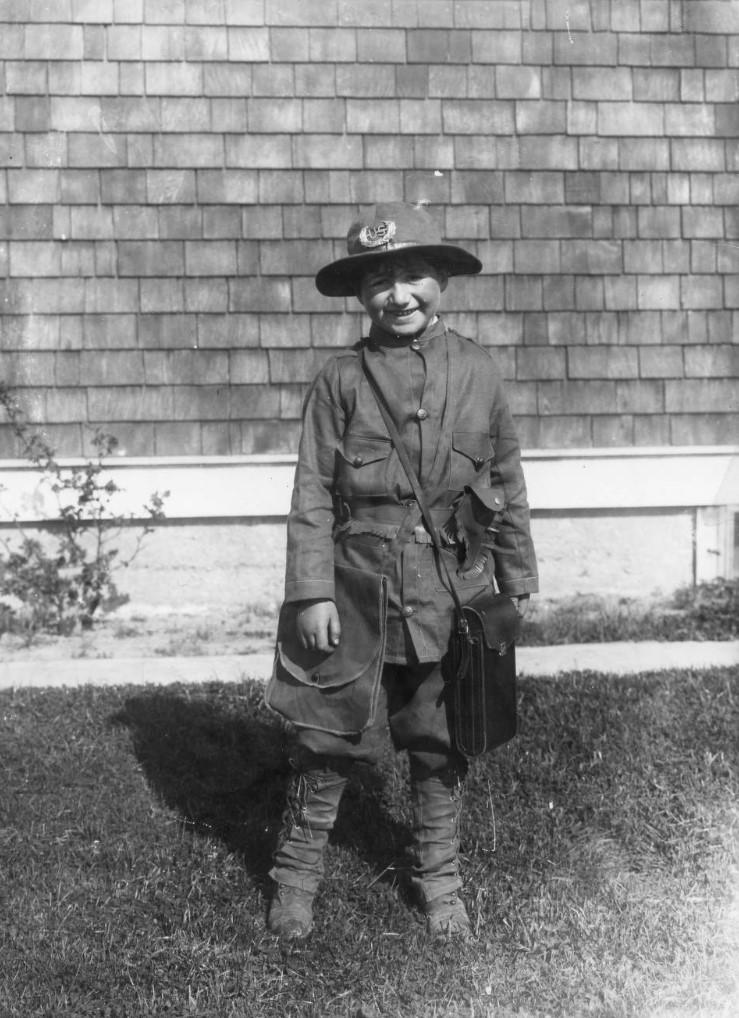
Source: Montana Memory Project
2nd Place in the Adult Category:
by Charlie Denison
The uniform fit better than Nicholas could have imagined. Looking in the mirror he felt proud. And better than that he felt closer to his father, a boisterous firefighter-turned-soldier stationed in Saint-Mihiel, France, where he was helping the U.S. lead the Allied attack against the Central Powers. In letters his dad was confident about the mission. And Nicholas didn't doubt it. He knew his dad would shut them down. Nothing could stop him.
"Come on, Nicholas, let's go outside and take your picture," his mother called from outside the room. She looked into the room and caught him by the mirror, an image that made her eyes water almost instantaneously.
Nicholas stormed out the door like he was hopping out of the trenches, anxiously watching his left and his right. He jumped over the stairs from the deck onto the grass and assumed an army crawl.
"Stay low," he yelled, slithering his way toward the neighboring ponderosa pines. "There are still a few Germans to take care of, but I got 'em. Won't let anything happen to you, Ma."
His mother, a tall, dark-haired woman in her mid-thirties, took big strides and took a seat on the white porch swing. She tried to play along but kept laughing.
"Look at you," she said, shaking her head.
"Watch this, Ma," he said as he wrestled an imaginary German to the ground.
"I got him, Ma" he shouted, jumping up and down in celebration. "Allied Forces prevail."
Before she could even respond he was on the ground again, tackling another invisible German, his hat falling off as he pretended to punch the pretend enemy.
If I want to get him to stand still for a photo I'm going to have to play the game with him, his mother told herself.
An idea surfaced, one that only required a little imagination, something her son had in abundance. He always did, even before his father went overseas. He'd play fireman.
"Congratulations, Nicholas Fugleberg," she said, standing firm, proper. "I, Congresswoman Jeannette Pickering Rankin, am honored to recognize you for your courage and bravery. Polson, Montana should be so fortunate to have such a daring and dashing soldier."
Nicholas collected his hat, brushed himself off and smiled wide.
"Can I have the honor of taking your picture?" she asked. "A hero like you should be celebrated from generations to come."
"Aw, Ma," he said, his cheeks reddening.
She snapped the picture, after which Nicholas ran over to her and gave her a big hug. She wasn't the congresswoman anymore, and he wasn't a soldier.
"When will daddy be home?" he asked.
"Soon," she said, a tear streaming down her cheek. "Soon."
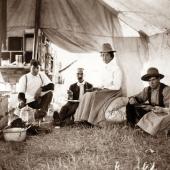
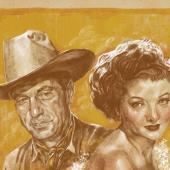
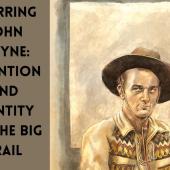
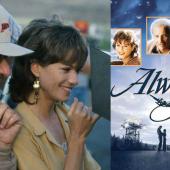
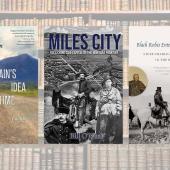
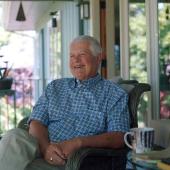
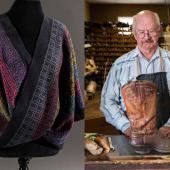
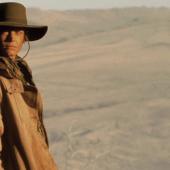



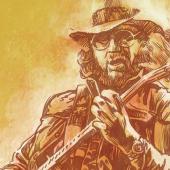
Leave a Comment Here